Germany donates US$ 4.6 million to WHO to close the equity gaps in COVID-19 and childhood immunizations
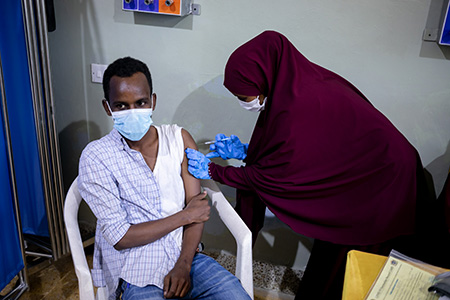 Alongside the government and partners, WHO supports COVID-19 vaccinations for eligible people. Photo credit: WHO SomaliaMogadishu, 4 August 2022 – The Government of Germany donated US$ 4.6 million to the WHO country office for Somalia in support of continued efforts to reach more people with COVID-19 and childhood vaccinations. Alongside the Federal Ministry of Health and Human Services, this contribution will be used to ensure the most vulnerable children and adults, including those living in remote areas, receive life-saving vaccinations.
Alongside the government and partners, WHO supports COVID-19 vaccinations for eligible people. Photo credit: WHO SomaliaMogadishu, 4 August 2022 – The Government of Germany donated US$ 4.6 million to the WHO country office for Somalia in support of continued efforts to reach more people with COVID-19 and childhood vaccinations. Alongside the Federal Ministry of Health and Human Services, this contribution will be used to ensure the most vulnerable children and adults, including those living in remote areas, receive life-saving vaccinations.
“COVID-19 has proven that health infrastructure is vital not only with regards to new diseases and viruses but also to existing ones,” said Sascha Kienzle, Deputy Ambassador of Germany to Somalia. “Germany therefore stands with those most disadvantaged and seeks to include them in health interventions to ensure a lasting impact on everyone.”
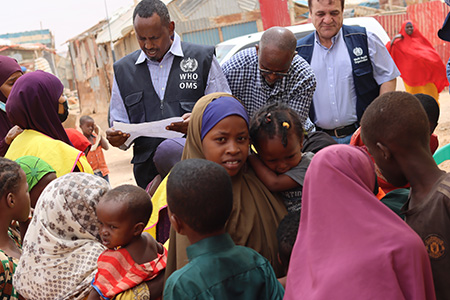 Health care workers search for children who have never received vaccines before to boost their immunity against preventable diseases. Photo credit: WHO Somalia/Mukhtar Sudani“We have recently sounded the alarm as our new data has shown that childhood vaccination coverage has continued to decline and thousands of children in Somalia have missed out on life-saving vaccines. COVID-19 has caused the largest and sustained backslide in childhood immunization in Somalia,” said Dr Mamunur Rahman Malik, WHO Representative to Somalia and Head of Mission.
Health care workers search for children who have never received vaccines before to boost their immunity against preventable diseases. Photo credit: WHO Somalia/Mukhtar Sudani“We have recently sounded the alarm as our new data has shown that childhood vaccination coverage has continued to decline and thousands of children in Somalia have missed out on life-saving vaccines. COVID-19 has caused the largest and sustained backslide in childhood immunization in Somalia,” said Dr Mamunur Rahman Malik, WHO Representative to Somalia and Head of Mission.
“We cannot emphasize how important these funds are to reach out to children who have missed out on life-saving vaccines, identify the zero-dose children and vaccinate them to close the equity gap, and at the same time protect the high-risk adult populations of the country against COVID-19. In this spirit, we are grateful for the support from the Government of Germany. With support from partners, WHO is collaborating with the Ministry of Health to use a blend of strategies, including fixed vaccination sites, accelerated outreach services and mobile teams, to vaccinate more children and adults in an integrated manner, thereby improving the uptake of COVID-19 vaccines as well as bringing the country on-track for childhood immunization goals.”
By using these creative strategies, the uptake of COVID-19 vaccines significantly improved in November, December 2021 and February 2022.
Around 13% of the Somali population has been fully vaccinated against COVID-19 so far. Somalia plans to vaccinate 40% of its population by the end of 2022, with more than 3.5 million people expected to be fully vaccinated by the end of September 2022 with these funds made available from Germany. By combining the acceleration of both COVID-19 and childhood immunization programmes in the past, WHO and its partners were able to identify and vaccinate more than 75 000 zero-dose children, who had never received vaccines, thereby closing the immunization gaps in children living in hard-to-reach areas and marginalized communities.
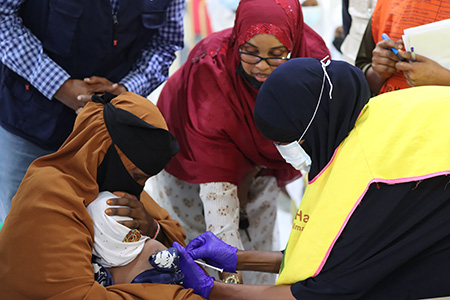 Skilled health workers vaccinate children against preventable childhood diseases, with support from partners. Photo credits: WHO Somalia/Mukhtar SudaniGermany’s support will also boost childhood vaccination, as Somalia is witnessing outbreaks of measles due to a decline in the rates of immunization, which is happening against a backdrop of rapidly rising rates of severe acute malnutrition owing to severe drought in the country. A malnourished child already has weakened immunity and missed vaccinations can mean common childhood illnesses quickly become lethal. The convergence of drought, risk of famine and a growing immunization gap threatens the lives of children.
Skilled health workers vaccinate children against preventable childhood diseases, with support from partners. Photo credits: WHO Somalia/Mukhtar SudaniGermany’s support will also boost childhood vaccination, as Somalia is witnessing outbreaks of measles due to a decline in the rates of immunization, which is happening against a backdrop of rapidly rising rates of severe acute malnutrition owing to severe drought in the country. A malnourished child already has weakened immunity and missed vaccinations can mean common childhood illnesses quickly become lethal. The convergence of drought, risk of famine and a growing immunization gap threatens the lives of children.
In addition to this support, the Government of Germany has donated over US$ 11 million to Somalia for the COVID-19 response, along with COVID-19 vaccines through the COVAX Facility and 1.3 million medical face masks in August 2021.
For additional information, please contact:
Judith Gosmann, Policy Officer Somalia Unit,
Kyle DeFreitas, WHO Somalia External Relations Lead,
Fouzia Bano, WHO Chief of Staff ai, Communications Officer,
Note to Editors:
Please see the links below for additional information on recent support received from the Government of Germany:
Government of Somalia, UNICEF and WHO mark World Breastfeeding Week with a call to step up breastfeeding-friendly environments for mothers and babies
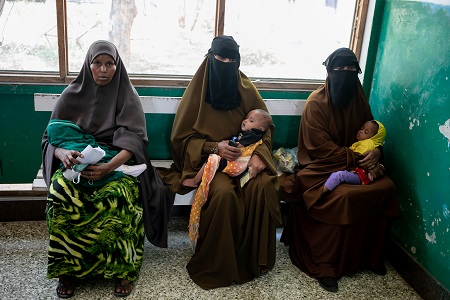 Only 34% of babies under 6 months are exclusively breastfed, according to the Somali GovernmentMogadishu, 1 August 2022 – While marking World Breastfeeding Week this year, the Ministry of Health and Human Services, Federal Republic of Somalia, the United Nations Children’s Fund (UNICEF) and the World Health Organization (WHO) called for a concerted effort from all actors to ensure breastfeeding-friendly environments for mothers and babies in all health facilities and workplaces in the country. Underpinned by evidence-based national policies, this would help improve exclusive breastfeeding rates among Somali women, and adequate nutrition and health among Somali children in both the short and long term.
Only 34% of babies under 6 months are exclusively breastfed, according to the Somali GovernmentMogadishu, 1 August 2022 – While marking World Breastfeeding Week this year, the Ministry of Health and Human Services, Federal Republic of Somalia, the United Nations Children’s Fund (UNICEF) and the World Health Organization (WHO) called for a concerted effort from all actors to ensure breastfeeding-friendly environments for mothers and babies in all health facilities and workplaces in the country. Underpinned by evidence-based national policies, this would help improve exclusive breastfeeding rates among Somali women, and adequate nutrition and health among Somali children in both the short and long term.
“We are calling on parents, families, community leaders, policy-makers and development partners to actively step up capacity and transform systems at all levels to support breastfeeding adequately,” said HE Dr Fawziya Abikar Nur, Somalia’s Federal Minister of Health and Human Services. “All the support systems, from family, community and health facilities, should be educated and capacitated to support mothers to optimally breastfeed their babies. This includes breastfeeding right from birth through early initiation of breastfeeding within the first hour of birth, exclusive breastfeeding during the first 6 months of the child’s life and continued breastfeeding up to 2 years and beyond.”
This is part of a global call to action to ‘Step up for breastfeeding: Educate and support.’ It comes at a time when Somalia is witnessing an increase in child malnutrition, including a reduction in infant and young child feeding practices, due to steep declines in household incomes, among other challenges. Shocks such as drought, flooding, conflict, displacement, and disease outbreaks like measles and COVID-19 have deepened inequalities and resulted in nutrition insecurity.
WHO and UNICEF recommend early initiation of breastfeeding within the first hour of birth, feeding the child only breast milk for the first 6 months (exclusive breastfeeding), and continuing to breastfeed for up to 24 months or beyond, with the introduction of timely, nutritionally adequate and safe complementary, solid foods at 6 months. It is important for mothers to offer colostrum, the first form of breastmilk released after giving birth, to newborns as it is high in nutrients, antibodies and antioxidants.
“Breastfeeding provides children the best start in life as it is designed for a child’s nutritional and immunological needs,” said Wafaa Saeed, UNICEF Representative in Somalia. “Breastmilk helps to prevent infections, promotes bonding between mother and child, regardless of setting, and provides food and nutrition security to infants from the very beginning of life, contributing to the food security of the whole family.”
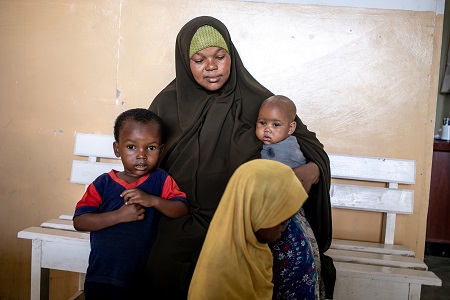 Somali mothers, generally caregivers of their families, need a supportive environment to be able to breastfeed their babies properly. Credit: WHO Somalia/ Ismael Taxta During World Breastfeeding Week, breastfeeding awareness campaigns will be launched throughout the country, and skilled breastfeeding counselling will be provided in various settings, including health facilities and clinics and through home visits by community health workers. The campaign will also stress that breastfeeding is still safe during the COVID-19 pandemic and the current drought emergency. Breastfeeding remains the essential, safest and cheapest food for the child, and it is a baby’s first vaccine, providing antibodies that give babies a critical boost.
Somali mothers, generally caregivers of their families, need a supportive environment to be able to breastfeed their babies properly. Credit: WHO Somalia/ Ismael Taxta During World Breastfeeding Week, breastfeeding awareness campaigns will be launched throughout the country, and skilled breastfeeding counselling will be provided in various settings, including health facilities and clinics and through home visits by community health workers. The campaign will also stress that breastfeeding is still safe during the COVID-19 pandemic and the current drought emergency. Breastfeeding remains the essential, safest and cheapest food for the child, and it is a baby’s first vaccine, providing antibodies that give babies a critical boost.
“In a fragile country like Somalia, affected by conflict and recurring emergencies such as drought, COVID-19, and other diseases, breastfeeding is an effective way to ensure child health and survival. Breastfeeding offers babies all the energy and nutrients that they need for their first months of life, and complements other foods after the first 6 months. We need to jointly create an environment to encourage Somali mothers to breastfeed their newborns and babies,” said Dr Mamunur Rahman Malik, WHO Representative to Somalia and Head of Mission.
As part of the Federal Ministry of Health’s national nutrition strategy 2020–2025, countrywide efforts will be scaled up with the primary goal to increase the number of babies aged 0–6 months old who are exclusively breastfed to above 50% by 2025. According to the latest government data, only 34% of babies under 6 months are exclusively breastfed.
“Breastfeeding must be considered a public health issue that requires capacity and education at all levels. Together, we can ensure that every mother has access to information, and skilled breastfeeding counselling, empowering her to give her baby the best possible start in life,” added the Health Minister.
###
Note to editors:
In 2018, a World Health Assembly resolution endorsed World Breastfeeding Week as an important breastfeeding promotion strategy.
The importance of breastfeeding is mentioned in the Holy Quran, in the 233rd verse of Sura Al-Baqarah, in which it is stated that: "mothers [should] breastfeed their children for a total of 2 years.”
For additional information, kindly contact:
Khadar Hussein Mohamud
FMoH Head Coordination and Communication
+252615602637
Fouzia Bano
WHO Communications Officer
+252 619 235 880
Lisa Hill
UNICEF Communication Manager
+252 613 642 623
Saving lives from cholera in drought-hit districts: WHO steps up vaccination campaign using oral cholera vaccines
 Skilled health care workers explain the benefits of vaccination to communities living in camps for internally displaced persons before offering them life-saving vaccines. Credit: WHO/Ismael Taxta31 July 2022 – As a mother of 3 who is a full-time carer for her young children, when Nesteho falls ill, her household comes to a standstill. Earlier this year, after breakfast one day, the 32-year-old started to suffer from severe bouts of vomiting, with watery diarrhoea. At first, she suspected it may have been bad food, but after getting herself assessed and examined, with the help of a pharmacist she knew, she realized she might have had cholera. Many others in her neighbourhood had been suffering from cholera at the same time.
Skilled health care workers explain the benefits of vaccination to communities living in camps for internally displaced persons before offering them life-saving vaccines. Credit: WHO/Ismael Taxta31 July 2022 – As a mother of 3 who is a full-time carer for her young children, when Nesteho falls ill, her household comes to a standstill. Earlier this year, after breakfast one day, the 32-year-old started to suffer from severe bouts of vomiting, with watery diarrhoea. At first, she suspected it may have been bad food, but after getting herself assessed and examined, with the help of a pharmacist she knew, she realized she might have had cholera. Many others in her neighbourhood had been suffering from cholera at the same time.
Somalia has been experiencing a protracted cholera outbreak, with uninterrupted transmission of the disease since 2017. This has left many Somalis like Nesteho, and their families, suffering from this disease, which is easily preventable.
Limited access to safe water and safe sanitation fuels situation
Cholera outbreaks occur when a large number of people have limited access to safe water and proper sanitation. With only 52% of Somalia’s population having access to improved drinking-water or safely managed drinking-water services, and the current drought making water even more scarce, communities struggle to keep waterborne diseases at bay. The drought has forced close to 1 million people to leave their homes in search of water, food and survival. Nesteho’s is one of these families, that now lives in a camp for internally displaced persons (IDPs) in the October section, in Hodan, Banadir region.
This year, from January to June, Somalia reported 8041 cases of suspected cholera and 37 associated deaths due to cholera. Many of these cases have been laboratory-confirmed. Around 54% of the people infected in 2022 were children under 2 years of age, 49% were female and 28% were reported to be severely dehydrated.
Cholera vaccination campaigns protecting Somalis
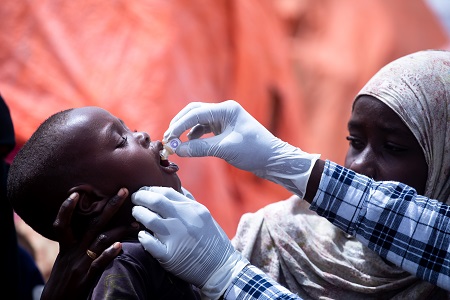 WHO supports the government to conduct vaccination campaigns to reduce the spread of cholera. Credit: WHO/Ismael TaxtaBefore the first round of a cholera vaccination campaign was conducted in Somalia, from 14 to 26 June 2022, with support from the World Health Organization (WHO), the United Nations Children’s Fund (UNICEF), and other partners, Nesteho Muse Mohamed did not realize there was a vaccine for cholera. However, in June, she heard social mobilizers in sound trucks explaining the benefits of cholera vaccines. When she heard a knock at her door during the week of the campaign, Nesteho welcomed the vaccinators and made sure they vaccinated her whole family.
WHO supports the government to conduct vaccination campaigns to reduce the spread of cholera. Credit: WHO/Ismael TaxtaBefore the first round of a cholera vaccination campaign was conducted in Somalia, from 14 to 26 June 2022, with support from the World Health Organization (WHO), the United Nations Children’s Fund (UNICEF), and other partners, Nesteho Muse Mohamed did not realize there was a vaccine for cholera. However, in June, she heard social mobilizers in sound trucks explaining the benefits of cholera vaccines. When she heard a knock at her door during the week of the campaign, Nesteho welcomed the vaccinators and made sure they vaccinated her whole family.
Somalia first began to administer oral cholera vaccines (OCV) in 2017, when the country had 78 865 cases and 1160 deaths reported due to cholera. Since then, the country has conducted a series of cholera vaccination campaigns in addition to other measures.
During the last OCV campaign, conducted from 14 to 26 June 2022, 4984 skilled health workers vaccinated 897 086 (96%) people aged one year and above, against a target of 934 511. They used microplans that serve as maps showing households, and made visits from house to house to vaccinate people over 5 days. They established fixed posts where access to communities was a challenge either due to insecurity or logistical problems. The campaign covered 9 hotspot districts in Banadir region, and the South West and Hirshabelle states.
Over a period of a week, more than 1250 social mobilizers, like the ones Nesteho heard, spread messages about the dates of the campaign and benefits of cholera vaccines. Around 396 supervisors and district-, state-and national-level technical experts supervised teams and monitored activities during the campaign.
Efforts to reduce the disease burden and deaths
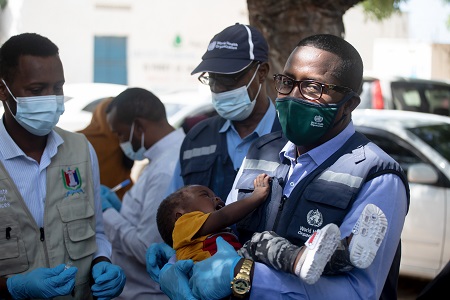 A health worker prepares to vaccinate a child against cholera. Around 900 000 people aged one year and above were vaccinated in the first round of the cholera vaccination campaign. Credit: WHO/Ismael TaxtaAll cholera vaccination campaigns in Somalia are conducted by the Federal and State Ministries of Health and Human Services, in collaboration with experts from the water, sanitation and hygiene (WASH) and health clusters, WHO, UNICEF, and inter-ministerial departments. The use of OCVs are supplementary measures considered by the government and its partners to end cholera and reduce cholera-related deaths in the country, in addition to stepping up other proven public health measures, such as improving access to safe drinking-water and safe sanitation or WASH interventions. Other measures used are risk communication and community engagement, case management, and enhanced disease surveillance, all of which are part of the country’s strategy to end cholera. This national cholera prevention and control strategy was crafted in 2019, with the aim of reducing cholera-related deaths by 90% in 2030.
A health worker prepares to vaccinate a child against cholera. Around 900 000 people aged one year and above were vaccinated in the first round of the cholera vaccination campaign. Credit: WHO/Ismael TaxtaAll cholera vaccination campaigns in Somalia are conducted by the Federal and State Ministries of Health and Human Services, in collaboration with experts from the water, sanitation and hygiene (WASH) and health clusters, WHO, UNICEF, and inter-ministerial departments. The use of OCVs are supplementary measures considered by the government and its partners to end cholera and reduce cholera-related deaths in the country, in addition to stepping up other proven public health measures, such as improving access to safe drinking-water and safe sanitation or WASH interventions. Other measures used are risk communication and community engagement, case management, and enhanced disease surveillance, all of which are part of the country’s strategy to end cholera. This national cholera prevention and control strategy was crafted in 2019, with the aim of reducing cholera-related deaths by 90% in 2030.
Surveillance records show that the number of cholera cases have decreased in Somalia in recent times, partly due to the success of vaccination campaigns.
In August 2022, the Federal Government of Somalia, with support from WHO and other partners, aims to conduct a second round of cholera campaign in the locations covered in the first round in June. This will ensure families like Nesteho’s can keep safe from cholera.
Related link
“Our lives have changed; thanks to water that we now have in our camp”
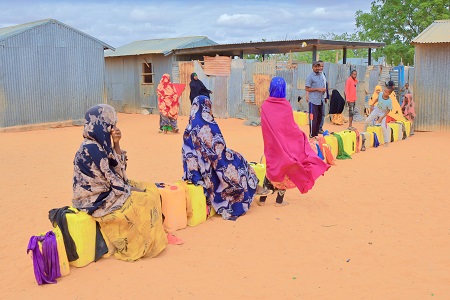 Since it was rehabilitated on 16 June, over 19 500 people around the Salama borehole in North Galkayo can now access safe water again. Credit - WHO/Somalia 24 July 2022 – For just over a month, from 7 May to 16 June 2022, Fatumo Yusuf Diriye spent 3 hours every day, walking to and from the nearest water source, 6 km away, to fetch water for her family. As she could carry only 2 ‘jirigaans” or pails of water at a time, and had to wait her turn in a long queue, her family had to use this water sparingly. They resorted to using ashes or sand to clean their hands.
Since it was rehabilitated on 16 June, over 19 500 people around the Salama borehole in North Galkayo can now access safe water again. Credit - WHO/Somalia 24 July 2022 – For just over a month, from 7 May to 16 June 2022, Fatumo Yusuf Diriye spent 3 hours every day, walking to and from the nearest water source, 6 km away, to fetch water for her family. As she could carry only 2 ‘jirigaans” or pails of water at a time, and had to wait her turn in a long queue, her family had to use this water sparingly. They resorted to using ashes or sand to clean their hands.
Fatumo knows that having to deal with unsafe water has contributed to her 3 children under 5 falling sick with diarrhoea many times before. On many occasions, she has had to rush them to the nearest health facility for support. This is one burden that families like Fatumo’s, who depend on her daily earnings from a local market, can do without.
Visit from the Government and WHO officials
One day, early in May 2022, Fatumo heard there was a team of high-level officials from the Government and World Health Organization (WHO) visiting the camp where she lived, in North Galkayo, to assess the effects of the ongoing drought. Even though she could not go to see them, later on, she heard a few community members had requested the heads of the high-level team to support them to fix 2 water pumps which were not functioning for longer than she could recall. The Salama water pump, which is a borehole close to Fatumo’s home, was one of them, and the Halaboqad borehole was the second one that hadn’t been functioning for quite some time.
The visiting high-level team was led by HE Dr Fawziya Abikar Nur, the Federal Minister of Health and Human Services, and HE Abdi Nasir Yusuf Haji, the Vice Minister of Health for Puntland state. Representing WHO, Dr Ahmed Al-Mandhari, WHO Regional Director for the WHO Eastern Mediterranean, and Dr Mamunur Rahman Malik, WHO Representative to Somalia, were also part of the team.
Delivering swiftly on a promise
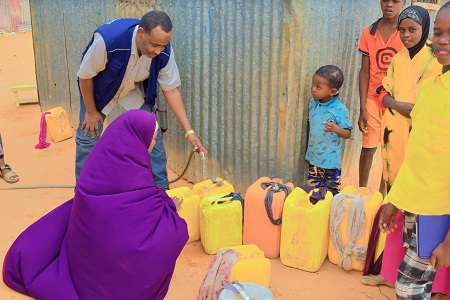 WHO conducts regular surveillance to test water quality, as water is linked with public health. Credit - WHO/Somalia
WHO conducts regular surveillance to test water quality, as water is linked with public health. Credit - WHO/Somalia
Fatumo, who has been living in a camp for the internally displaced since 2017, had heard the WHO team agreed to provide support, but was not sure how this would pan out. To her joy and surprise, within a few days, an expert came by to assess the Salama borehole. Around a month later, the Salama borehole was functioning again.
“Our lives have changed thanks to having water now from the Salama borehole, for drinking and also for all our household purposes,” says Fatumo, as it takes her just 30 minutes to fetch water now. The Diriye family can now collect at least 4 buckets of water, as their source, the borehole, is just above half a kilometre away. Hers is just one of the families living in one of 6 camps and 2000 households that now have access to clean water from the Salama borehole.
With WHO’s interventions to rehabilitate both the Salama and Halaboqad boreholes, 19 716 people now have access to clean water. This will translate to clean drinking- water, fewer waterborne diseases, like cholera and diarrhoea, healthier populations, and better sanitation. By protecting their families from preventable diseases, Fatumo and many parents like her can devote their time and resources to raising their families instead of coping with the stresses related to fighting diseases.
Access to water is a recognized human right
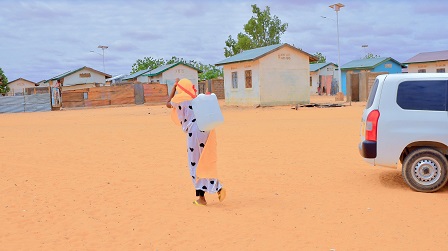 Fatumo carries water back home to top up her supply for the day. Credit - WHO/Somalia Currently, only 52% of the population in Somalia has access to improved drinking-water (the population using safely managed drinking-water services). In the internally displaced persons’ (IDP) camps like Salama, this number is staggeringly low. Recurring droughts, such as the one ongoing, make water an even more scarce resource.
Fatumo carries water back home to top up her supply for the day. Credit - WHO/Somalia Currently, only 52% of the population in Somalia has access to improved drinking-water (the population using safely managed drinking-water services). In the internally displaced persons’ (IDP) camps like Salama, this number is staggeringly low. Recurring droughts, such as the one ongoing, make water an even more scarce resource.
Around the world, WHO and the United Nations Children’s Fund (UNICEF) found that in 2019, 2.2 billion people lacked access to safely managed drinking-water services. In July 2010, the United Nations General Assembly recognized access to water and sanitation as a human right. The Health Assembly acknowledged that every human needs to access “between 50 and 100 litres of safe, acceptable and affordable water a day for personal and domestic uses”. The General Assembly also stated that families’ main water source should be within 1 km of their home and that it should not take longer than 30 minutes for a family to access water.
To complement this, the UN Sustainable Development Goal (SDG) 6 aims to ensure availability and sustainable management of water and sanitation for all. This will reduce the burden of waterborne diseases, and advance progress towards universal health coverage.


